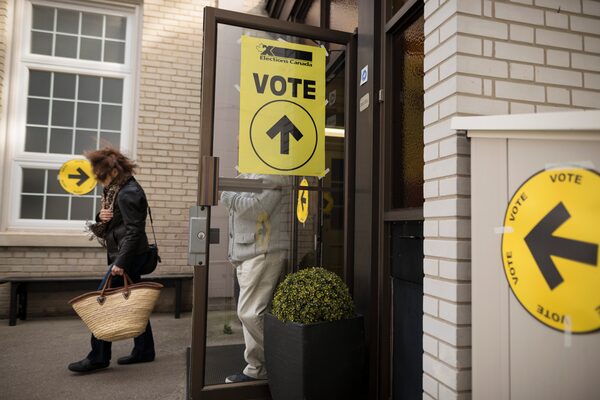
A voter leaves the West Toronto Baptist Church polling station during election day in Toronto on Oct. 21, 2019.Tijana Martin/The Canadian Press
The Canadian government was warned after the 2019 federal election that an “active foreign interference network” on behalf of the Chinese state was at work during the campaign.
This intelligence brief dated Feb. 21, 2020, was released this week to a Commons committee investigating foreign interference in Canada. Most of the text in this document has been heavily censored by government before its release.
But the second item on the brief, which was prepared by the Privy Council Office, talks of “subtle but effective interference networks” under the heading of China-Canada.
It goes on to say that “investigations into activities linked to the Canadian federal election in 2019 reveal an active foreign interference (FI) network.”
Dominic LeBlanc, the federal minister responsible for democratic institutions, told the Commons standing committee on procedure and house affairs on Tuesday, that regardless of foreign interference, a task force of public servants determined that this meddling did not alter the outcomes of the 2019 and 2021 elections.
“The Chinese government regularly attempts to interfere in various aspects of Canadian society,” Mr. LeBlanc said. “The good news is we have a robust security apparatus that follows these threats, that intervenes.”
He said what reassures him is “the experts that are empowered to do this work have confirmed that none of these attempts to interfere have constituted, in any way, something that would have had an adverse effect on the election results and the election outcomes.”
The Commons committee is probing foreign interference amid a string of revelations about meddling by China. Human-rights group Safeguard Defenders has alleged China is running secret police stations around the world, including five in Canada. RCMP Commissioner Brenda Lucki said the Mounties are investigating broad foreign interference by China in Canadian affairs. In Nov. 1 testimony, Adam Fisher, director-general of intelligence assessments at CSIS, warned that China is the “foremost aggressor” when it comes to foreign interference in Western countries, and that it works within their political systems to “corrupt” them.
Mr. LeBlanc, in response to a question from Conservative MP Michael Cooper, acknowledged he had been briefed this year on Chinese state interference in the 2019 election but declined to elaborate, citing the need to keep security briefings secret.
Conservative foreign affairs critic Michael Chong said revelations that Ottawa was informed of an “active foreign interference network” on behalf of Beijing in the 2019 election campaign demonstrates the need for Prime Minister Justin Trudeau’s Liberal government to share details of what happened.
The government made a commitment to release internal documents related to foreign interference to the procedure and house affairs committee. But, in practice, vast portions of the documents have been redacted before their release to MPs, leaving page-after-page of blank space.
“I think the government needs to take this interference more seriously than it has,” Mr. Chong said. He noted that in one document, the Canadian Security Intelligence Service had urged Ottawa to release details of foreign interference to draw attention to what is happening.
“CSIS advised them to use sunshine and transparency to reveal publicly what is going on as a way to counter interference by Beijing,” Mr. Chong said.
He accused Mr. Trudeau of failing to live up to his public commitment to share with MPs what the government knows. “These redacted documents are pages and pages of blank nothing.”
David Morrison, who served as acting national security adviser to the prime minister at the time of the 2021 election campaign as well as after the 2019 election, said there was no jump in foreign meddling during these contests. “What I would say there is a kind of baseline level of foreign interference, or attempted foreign interference, at all times that we need to be vigilant” about.
But, “there was no spike in foreign interference – that I am aware of – in either the 2019 election or the 2021 election,” Mr. Morrison, now deputy minister of foreign affairs, told MPs on the committee.
The Security and Intelligence Threats to Elections (SITE) Task Force set up to monitor threats to federal elections never issued any public warning about foreign interference during the 2019 or 2021 campaigns.
Asked what threshold of concern would have to be reached before the bureaucrats on the task force issued a public notification, Mr. LeBlanc told MPs that members of the arms-length body “enjoy certain discretion when it comes to notifying Canadians.” He said it would be up to them to assess whether or not Canadians should be alerted and this depends on the impact this meddling might have, the bearing on ridings, and whether it’s of national or regional scope.
Foreign Affairs Minister Mélanie Joly told the committee that China has grown very adept at disinformation aimed at Canadians. “China shows growing sophistication in carrying out online campaigns to influence Canadians and people worldwide. Beijing can quickly saturate social-media platforms with messaging but is also nimble enough to micro-target anglophone – and francophone – and Chinese-speaking audiences in Canada.”
 Steven Chase
Steven Chase